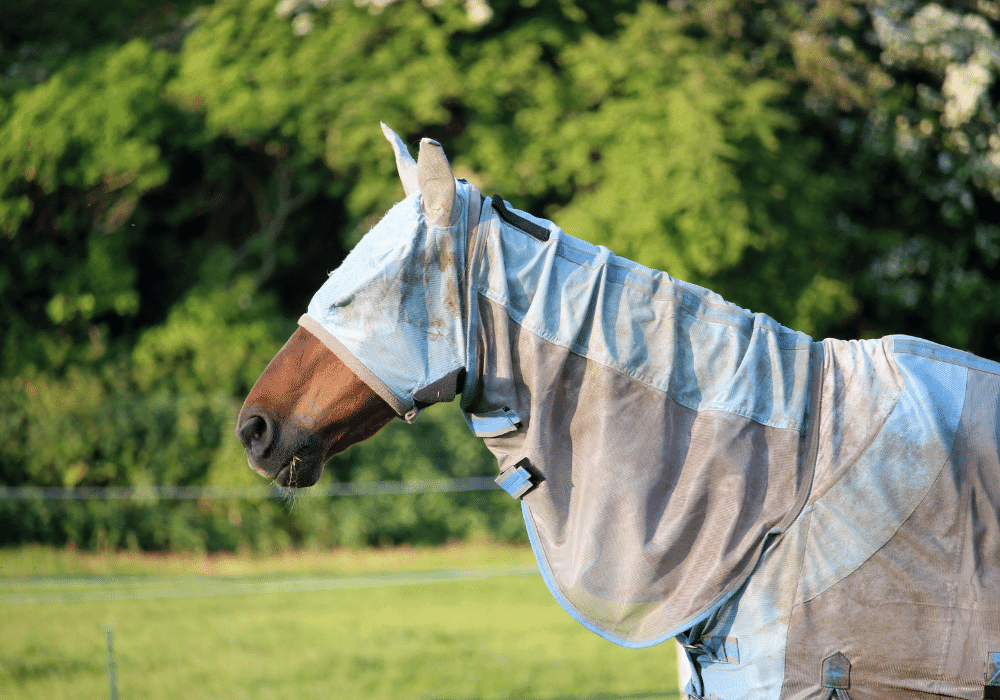Sweet itch, sometimes known as Summer Seasonal Recurrent Dermatitis or Equine Insect Bite Hypersensitivity, is a very common and irritating allergic skin condition. It can affect any horse, pony or donkey, and is most prevalent between March and November. This blog article outlines the main sweet itch symptoms found in horses, ponies and donkeys.
What is Sweet Itch?
Sweet itch is an allergic skin condition. It is caused by the immune system’s extreme reaction to the saliva of biting insects (most commonly midges in the UK). This allergic reaction happens when the horse’s immune system attacks its own cells in response to the protein in the saliva of biting insects. Whilst sweet itch can affect any horse or pony, it can also be genetic. Native ponies, for example, have been found to be at an increased risk of sweet itch.
Sweet Itch Symptoms
Sweet itch symptoms can include:
- Patchy hair loss in areas where the horse has been bitten
- Excessive itching
- Excessive grooming
- Vigorous tail swishing
- Excessive rolling
- Head shaking and restlessness
- Changes in behaviour: lethargy, agitation, irritability, impatience, lack of engagement or concentration when being ridden
The most obvious symptoms of sweet itch are the bald patches that develop where the horse has been bitten. The hair loss tends to occur at the base of the mane and tail. However, the face, withers, back, belly and rump can also be affected as these are also areas commonly targeted by biting insects. More advanced sweet itch can result in the skin thickening and folds developing as the hair becomes sparse and coarse. Flaky dandruff may also be present.
Why Does Sweet Itch Cause Hair Loss?
Hair loss in horses suffering from sweet itch occurs because of excessive rolling, grooming and scratching, which the horse does to relieve the intense itching. Affected horses may try to scratch themselves on anything they can, and this can cause the skin to become inflamed, crusty and sore. Broken skin can also lead to infection.
Other Sweet Itch Symptoms
Aside from the hair loss, sweet itch can also affect a horse’s behaviour. The horse may seem lethargic, agitated, restless or impatient on the ground or when ridden. Restlessness or head shaking may also be seen when flying insects are close by.
Managing Sweet Itch in Horses
Currently, there is no cure for sweet itch, and affected horses will see a recurrence of the condition every year, as soon as the midges become active and begin biting (usually March to November).
Managing sweet itch primarily relies on minimising the horse’s exposure to biting insects, especially midges. Therefore, it is important to adapt your horse’s management before the symptoms of sweet itch emerge.
Reducing exposure to biting insects is best achieved via a good quality fly rug. Ideally get one that fits your horse well and covers the neck up to the ears with a belly band and long tail flap. Fly rugs need to be worn at all times (except during exercise) and ideally applied from March onwards, such that the horse is wearing them prior to the onset of midge season. Maintaining clean fields and stables can help reduce the number of biting insects near your horse. Regular poo picking and cleaning of water troughs is key. Avoiding turning out in marshy or boggy fields, or those near ponds, will also help. Stabling your horse overnight (from dusk until dawn) will mean they are inside when the midges are at their most active.
If your horse or pony is already suffering from sweet itch, then it is important to try to reduce their exposure to biting insects and take steps to minimise the itching. Sweet itch is incredibly uncomfortable for the horse, and the symptoms are only made worse as the horse scratches and grooms to relieve the irritation. Soothing lotions and shampoos can help provide some relief, as can icing or cold hosing.
Take a look at our guide to sweet itch treatment and managment options for more information.
Avonvale Equine Vets | Independent Equine Vet Clinic
At Avonvale Equine Vet Practice, we are always happy to advise our clients on sweet itch and other equine ailments. There are a range of options available to manage sweet itch symptoms, including various medications. If your horse, pony, donkey or mule is suffering from sweet itch, or you would like more information on how to manage the symptoms, register your horse with us today.








